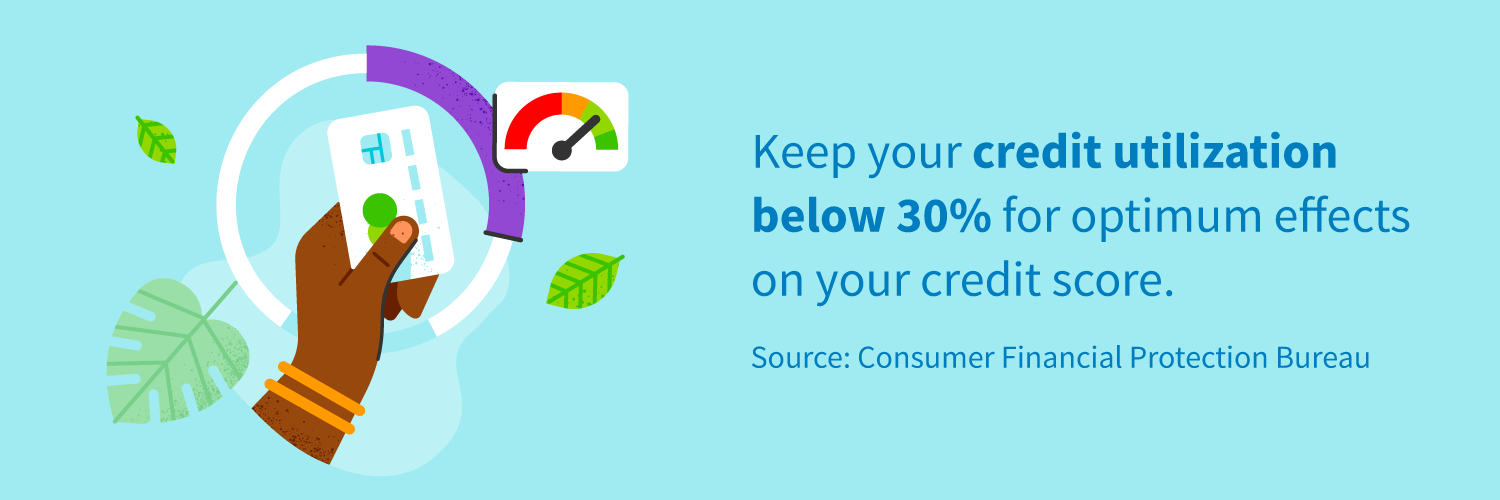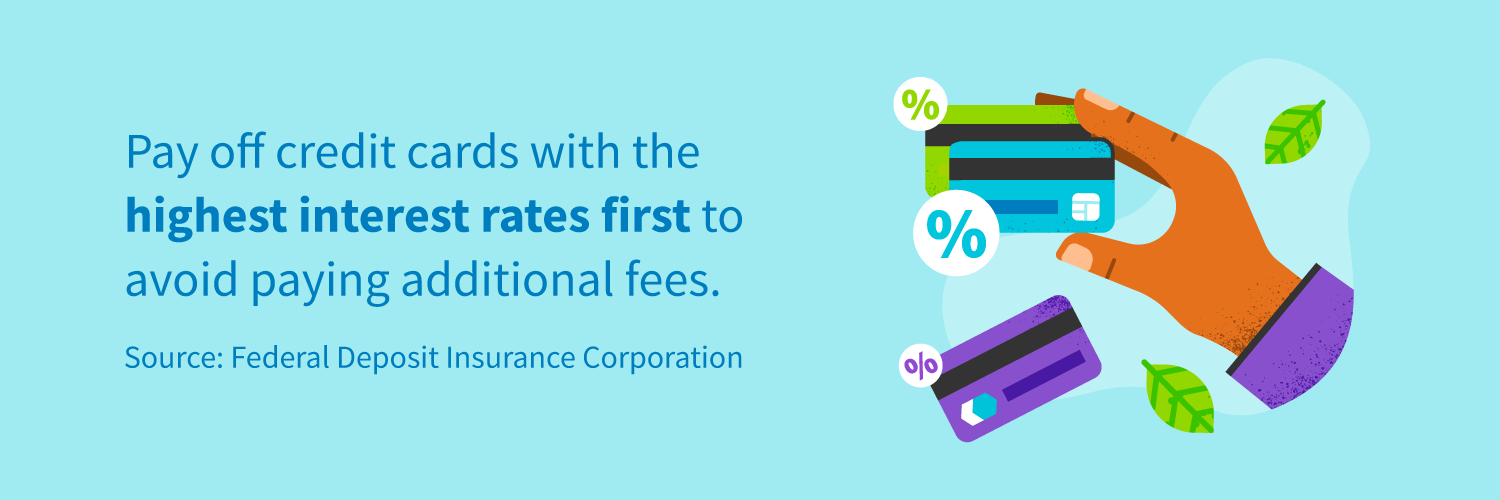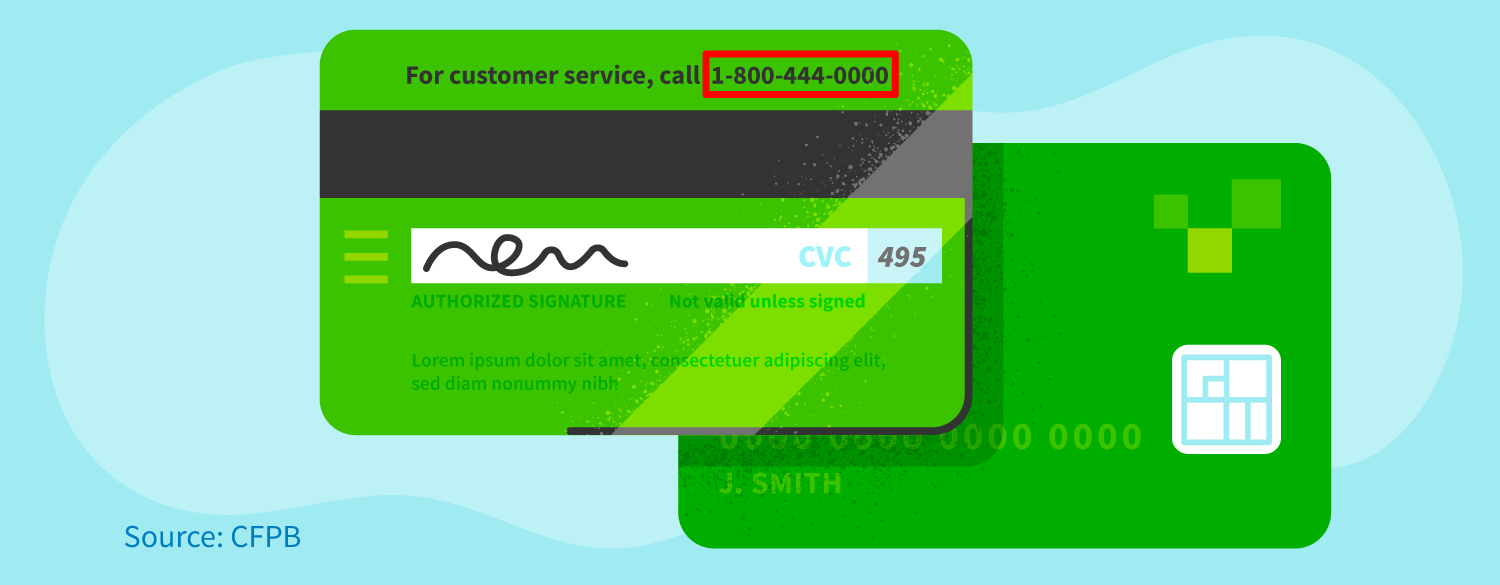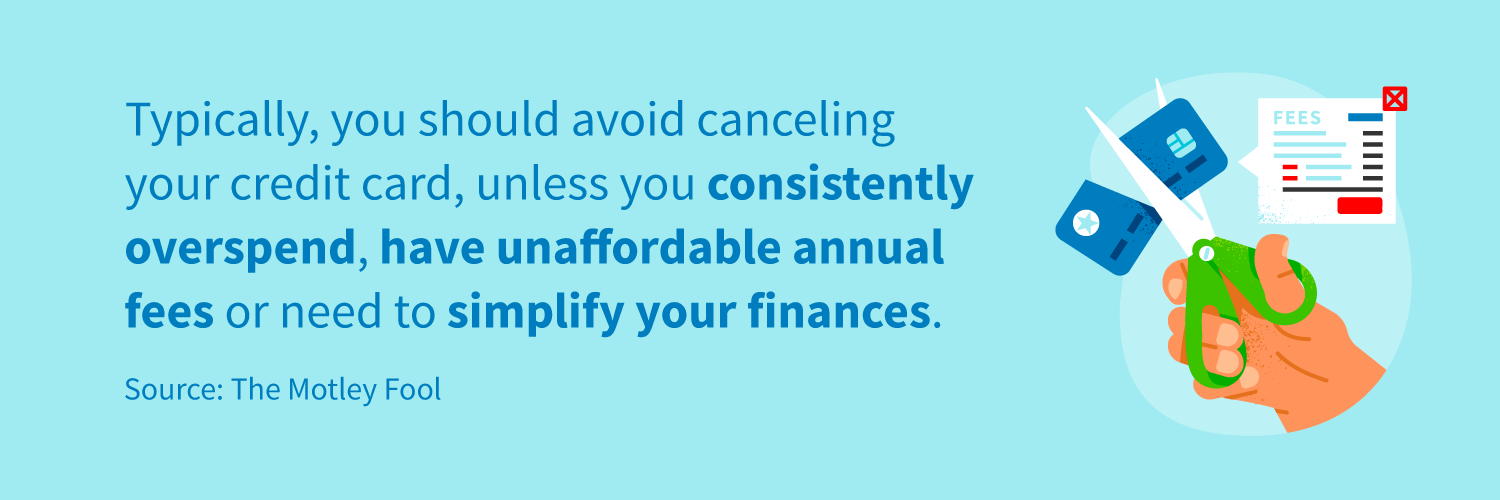
Disclosure regarding our editorial content standards.
Let’s say you went to buy a mid-century modern bed frame to celebrate your independence and living on your own. Upon purchasing, you were enticed by an interest-free credit card with deferred interest for 12 months.
Unfortunately, you didn’t read the terms before the purchase and only realized after the fact that you’ll be responsible for the 25-percent interest rate after one year. Closing the account sounds logical since you wouldn’t dare spend another dime on a card with such a high interest rate, right?
In reality, you might be better off paying the balance of the card and keeping it in your sock drawer instead of canceling it. That is, depending on your financial profile and spending habits, it’s worth considering the implications of your credit score in both situations. Canceling your credit card can decrease your score, but if you can’t stop spending on an account with a high interest rate or you can’t afford your annual fee, closing it might be your next best option.
If the latter, consider that you can cancel a credit card with the least impact on your credit score by taking the following steps:
- Step 1: Pay to a zero balance on the credit card
- Step 2: Call your credit card company
- Step 3: Get a zero balance letter
- Step 4: Check your credit score
Is It Bad to Cancel a Credit Card?
You should only cancel a credit card if you deem it absolutely necessary, like in the event you continue to spend more than your means on the card. Canceling a credit card can have a negative impact on your credit score by affecting three major scoring factors: your credit utilization, your credit mix and your credit history.

- Credit Utilization: Credit utilization is a factor that measures your available credit limit against how much you spend. The closer you are to spending the entirety of your credit limit, the higher your utilization ratio will be. A higher credit utilization translates to a larger negative impact on your credit score.
Example: If you have two cards with a limit of $1,000 each and you have a balance of $500 on one, canceling one of your credit cards will adjust your credit utilization from 25% to 50%.
- Credit Mix: Lenders will consider the variety of loans when determining a responsible borrower. If you remove your only credit card and your only outstanding loan is a mortgage, you’re effectively removing all revolving credit, which will negatively impact your score.
- Credit History: The longevity of your credit is a major factor that determines your score. Credit bureaus view a longer credit history as more credible or, dare we say, creditable, as they consider this a telltale sign of a responsible borrower. Canceling the credit card that you’ve had the longest may have an adverse impact on your overall score.
How to Close a Credit Card
To cancel a credit card, you should first pay off the account in its entirety so you have a balance of zero. Next, call your credit card company and get a zero balance letter for your records. Finally, you should check your credit score and confirm the issuer reported the cancelation.
Before closing the account, weigh the pros and cons. Understand the implications of canceling your credit card, like how it will affect your credit score versus if you kept it open. If you’ve made the decision to close the card, cut up or shred the card so that the information is completely unrecoverable—this will help you avoid identity theft and fraud.
Step 1: Pay to a Zero Balance on the Credit Card
The first step, and arguably the most important, is paying your credit card balance in full. Contact your issuer to confirm the final balance amount, including outstanding fees and interest payments. If you don’t pay the entire amount, the interest and fees can continue to accumulate.

If you can’t pay your final balance in full, consider freezing the card until the total amount is paid, or transfer the balance to another credit card with better terms. Make sure there are no automatic payments linked to the credit card and all authorized users are aware the account is being closed.
Double-check that you’ve collected all redeemable rewards. Rules will vary by program, and in some instances, you may be able to transfer rewards balances. If not, use any remaining cashback or points before canceling your credit card.
Step 2: Call Your Credit Card Company
Find the customer service number of your issuer on the back of your credit card and speak to a bank representative. Let them know you want to close your account, and be prepared for promotions and offers to combat the account closure. Make note of the date and time you made the call for your records.

Step 3: Get a Zero Balance Letter
Although your account should have been closed by the representative after making the call to your issuer’s customer service line, you should get the confirmation in writing.
To request written confirmation, send a letter to the lender with the following information:
- Your details: Include your name, address, phone number and account number.
- Details about the call with the customer service rep: Write the representative’s name and the date and the time of the call.
- Payment verification: Attach a confirmation receipt that your final balance has been paid in full and include it with the letter.
- Your request: Include the action item you want your bank to complete. Let them know you want your credit report to state that the account was closed at your request.
Make a copy of your letter, and send it to your issuer via certified mail. Doing so will provide clarity and proof of the request for future credit report discrepancies.
Step 4: Check Your Credit Score
The full effect of canceling your credit card may not immediately appear on your credit score. In a few weeks, check the report to make sure it accurately reflects the status of the account closure. If you’re not seeing the update, contact the credit card company first, and if all else fails, file a dispute with the credit bureau.
When to Close a Credit Card
Avoid closing the credit card you’ve held the longest. Additionally, consider any loans you’ll need to take out in the near future. Canceling your credit card will likely increase the interest rate of that loan. Situations where it may be advantageous to close your credit account include:
- You can’t control your spending: An unpaid balance on a loan will negatively impact your credit score as much as, if not more than, closing a credit account. If you continuously overspend on a credit account and you can’t keep up with the monthly payments, it may be time to cancel your credit card.
- You can’t afford your annual fee: If you have a high annual fee that you can’t afford or isn’t worth the rewards, it may be worth transferring the balance to a card with terms that fit your lifestyle more closely. Make sure to use any remaining rewards points before closing the account.
- You need to simplify finances: If you’re a joint account holder and you need to part ways, you can’t necessarily remove the other person from the account as you would if they were labeled an authorized user. Simplifying your open accounts by canceling the credit card may also help you track and remember outstanding bills and alleviate the need to pay the balance of purchases you didn’t make.

Alternatives to Canceling Your Credit Card
Typically, it’s better to keep credit cards open and not use them than to cancel them entirely. Because of its adverse effects on your credit score, canceling will likely hurt you more to eliminate a line of credit than to simply remove the card from your wallet.
Consider the alternatives to canceling your credit account before making the call to your customer service rep:
- Cut up your credit card: If your credit card has no annual fee, consider cutting it up or putting it where you won’t be tempted to use it. Doing so will ensure your credit utilization isn’t affected and will continue to build a credit history—that is, as long as you have a zero balance on the card.
- Negotiate your rate: If you’re beginning to miss your monthly credit payments, consider negotiating your terms with your issuer to get a lower interest rate. If unsuccessful, consider transferring the balance to another card with a lower rate to make the payments more manageable.
- Change products: If you’re struggling to pay the annual fee associated with your credit card or you find that the benefits aren’t valuable enough for you to pay those fees, consider downgrading the card with the same issuer for a card with no annual fee.
Although there are plenty of alternatives to closing a credit account, you should still understand how to cancel a credit card the right way. In the event that you need to close your account, do so in a way that has the least impact on your credit score and monitor your credit score closely for the next few months.
Sources: CFPB | FDIC | The Motley Fool






